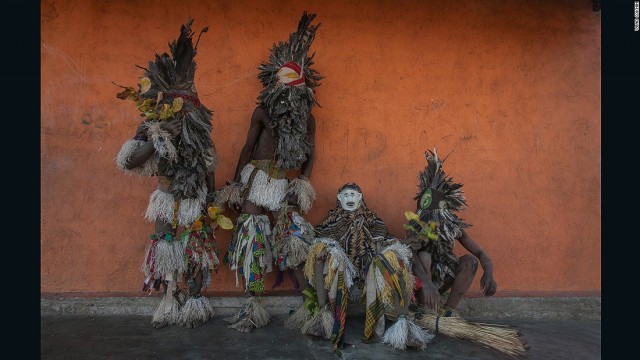Secret Societies
The English term “secret societies” refers to a wide range of traditional cults in Africa. Members of these groups possess secret knowledge gained through participation in rituals. Belonging to a secret society gives its members power in the community.
During the colonial era, Europeans in Africa viewed secret societies with alarm. They felt threatened by the involvement of these groups in warfare and politics among the African chiefdoms. Europeans believed that secret societies promoted anti-colonial activity, and some colonies attempted to limit their power. In 1897 British authorities in SIERRA LEONE banned the practice of marking commercial crops and palm trees with symbols—a secret society's way of controlling the size of harvests. As colonial fears grew, many Europeans came to believe that secret societies were widespread, tightly organized groups devoted to rebellion and cannibalism.

Role of Secret Societies
Today, anthropologists recognize that secret societies are highly diverse and that many of them play a role in political and legal institutions. Among the YORUBA people of western Nigeria, members of the Ogboni society sit on a council with the king. In coastal KENYA, elders belonging to the Vaya society act as judges that determine whether a person is guilty of moral wrongdoing.
Other secret societies have religious or social purposes. Some focus on a single important rite, such as the INITIATION RITES that mark a child's passage into adulthood. Societies may also be associated with particular skills or activities, such as hunting, blacksmithing, making war, or regulating sexual conduct. In some cases societies address a variety of political and social concerns.
The key element in all secret societies is the “secret,” which usually involves the details of a group's initiation rite and other rituals. Other special knowledge may include important historical and political information not possessed by others in the community. Although people outside the society may know its secrets, they do not hold the status or power of members because their knowledge has not come through rites and personal experience.
Poro and Sande Societies
In western Africa the Poro association for men and the Sande or Bondo association for women have wide-ranging activities and interests. Traditionally, all boys in Poro areas must be initiated into the society as part of becoming adults. Elder members generally have higher rank and greater secret knowledge than younger members, whose labor and services they often control. Poro leaders make important community rulings about such matters as land disputes and political succession. The Poro society also controls the timing of certain harvests and passage along trade routes. In some urban or Muslim settings, governmental or Islamic authorities now hold many of the powers claimed by the Poro, and fewer boys are brought into the association.
The women's Sande or Bondo society continues to flourish even in urban and Muslim locations because its power does not conflict with that of other authorities. The Sande or Bondo association gives the status f adulthood to girls. Its spirit is a river spirit whose powers involve women's secret medicines, including those used for childbirth. The leadership and organization of the women's society are closely linked to those of the Poro. This connection is especially clear in some parts of LIBERIA, where the two societies alternate their “rule” over communities in different years. In Sierra Leone, Muslim Sande has emerged, with Muslim songs replacing the traditional ones. (See also Masks and Masquerades, Religion and Ritual, Witchcraft and Sorcery.)